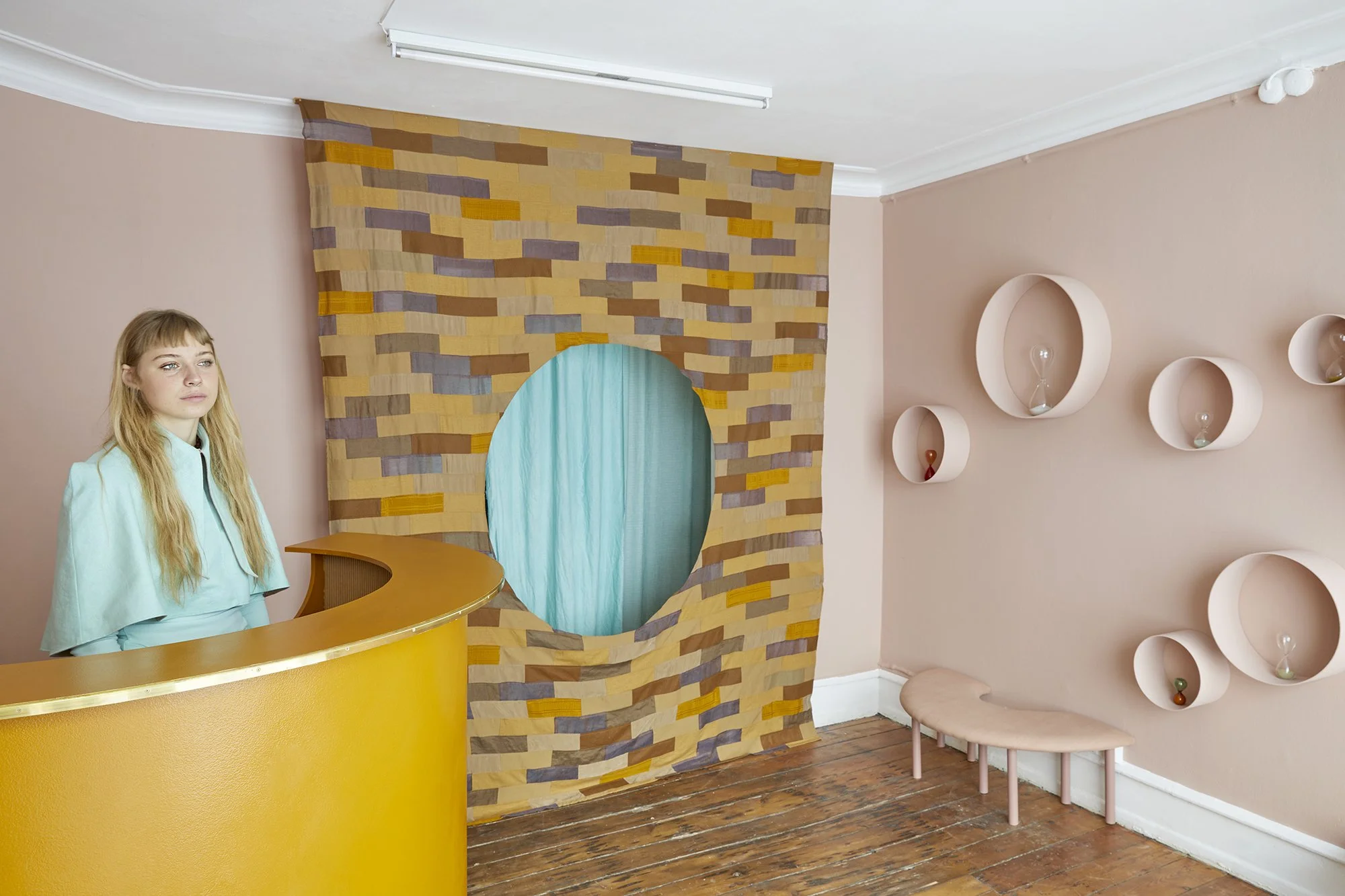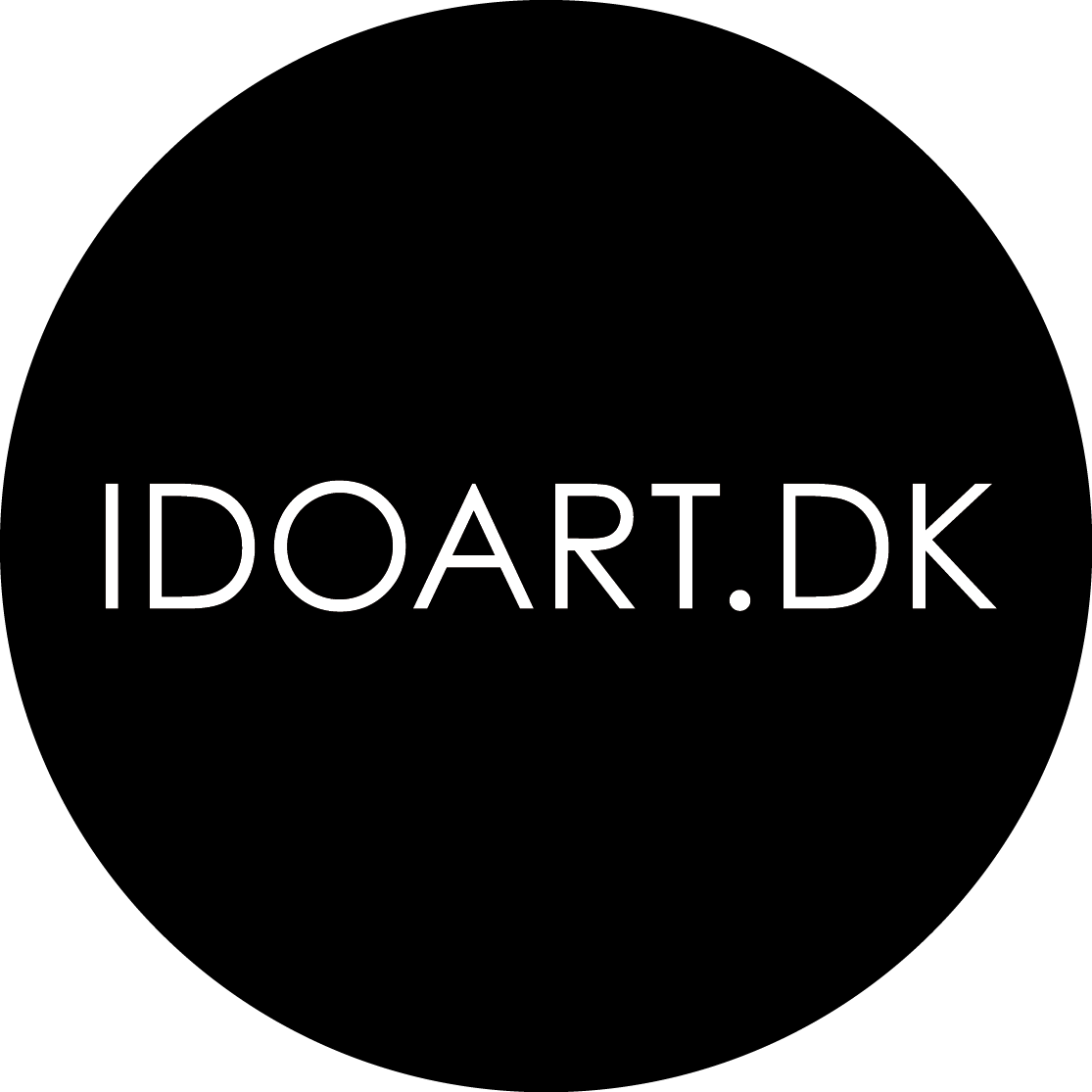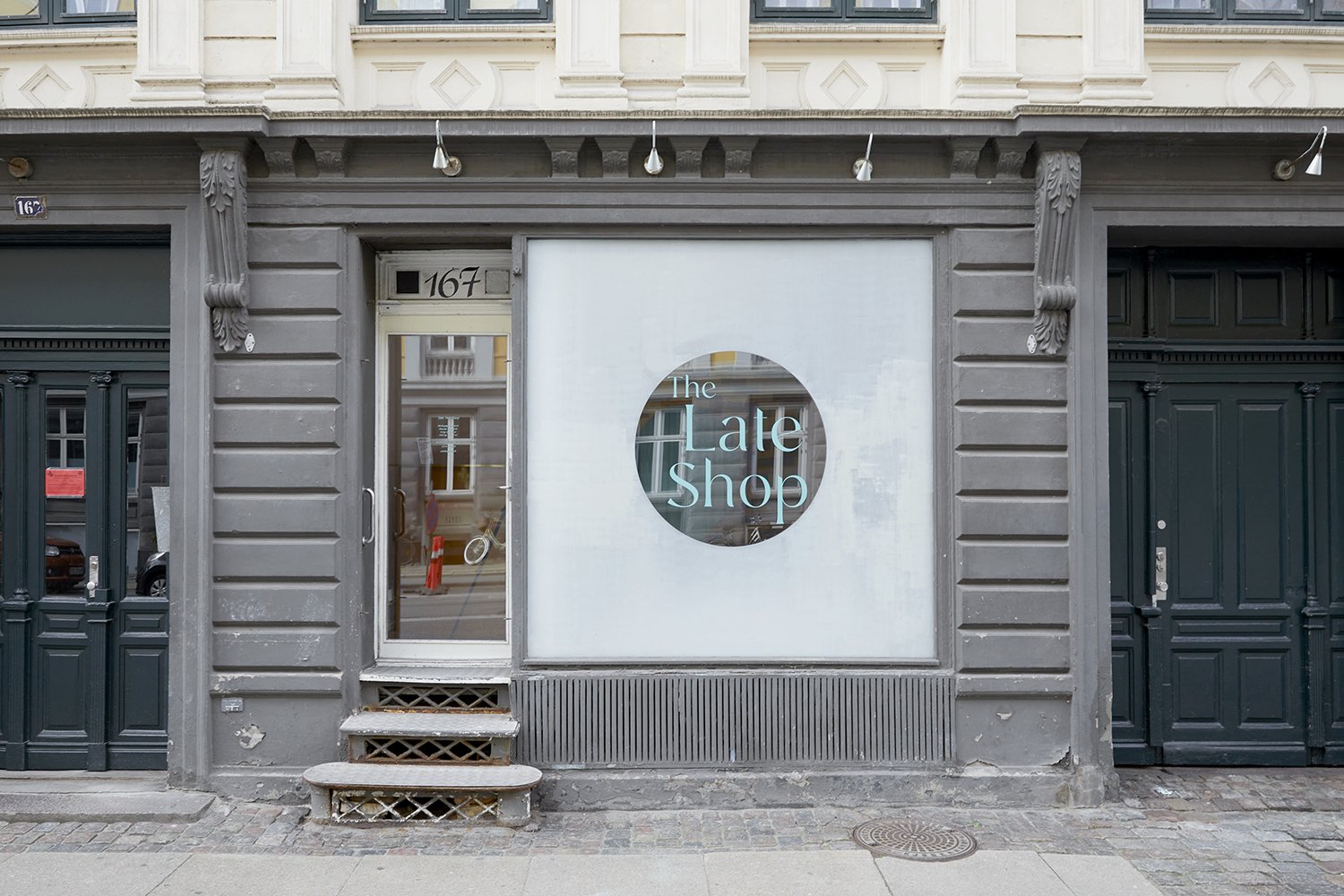RADICAL ENCOUNTERS WITH VALUE AND (YOUR) TIME

Just a minute. No, wait for it. I am about to tell you of an exhibition that I cannot tell you about. Do you feel like spending your time on this? How can I make you lean in? Will you allow me to take your time?
The Late Shop at SixtyEight Art Institute is a performative, participatory exhibition by the three visual artists Line Sandvad Mengers, Lise Tovesdatter Skou, and Hanna Toticki. It is a sensuous presentation of time and exchange, but deep conversations about value and care erupt between the lines.
Line Sandvad Mengers, Lise Tovesdatter Skou and Hanna Toticki, The Late Shop. SixtyEight Art Institute, 2022. Photo: Jenny Sundby.
As I entered the street-facing room of SixtyEight Art Institute, I was met by a dusty-rose, soft, and textile-heavy interior in circular forms. A graceful assistant was standing behind a round counter – her eyes did not meet mine. I found a spot on a bench and sat down to study the space.
On the wall, I saw nine circular shelves neatly placed and each holding an hourglass timer of different sizes and time measurements. A large curtain constructed in brick-shaped patterns, made of verdigris green, dusty blue and earth-toned textile parts covered the entrance to the backroom. A clock was ticking in the background. I was in a waiting room.
Manager for The Late Shop, Marina Mors Vestergaard. Photo: Jenny Sundby.
Line Sandvad Mengers, Lise Tovesdatter Skou and Hanna Toticki, The Late Shop. Photo: Jenny Sundby.
The assistant slowly approached me at a careful pace. From this moment on, the concept of The Late Shop relies on the visitor's discretion. And I will honour that. So, I cannot tell you more about my experience at the exhibition. The ownership and knowledge of my investment there remain mine alone. But that leaves us precious time to reflect on notions of exchange, value, care, and – yes – time.
How do we invest our time on a daily basis? Who and what are we inclined to spend our time on? These seem like basic questions, but correctly something that we rarely think about while being busy living our lives. And if we do, it might be to optimise the time we have. Because that is what society has taught us. The more we can do in a day, the better. It creates apparent value. But what if our surroundings urged us to stop and smell the flowers? What if we were taught that time can generate several forms of value? To make time matter?
Manager for The Late Shop, Marina Mors Vestergaard. Photo: Jenny Sundby.
We perceive our shared time as linear – with a past, present, and future. In that sense, time is only going forward. Only evolving. Yet we also perceive time as circular – as hours end and new ones begin. The day dawns, and the night falls. And then it happens all over again.
Spring breaks the winter and feeds into summer; fall breaks the summer and leads to another winter. A constant circulation. These multiple modes of temporal perception continue into our subjective grasp of time. This grasp is linked to what happens – or what does not happen – in a concrete moment or period. Time can seem so short and so long. And time is divergent for different observers and therefore is relative (Albert Einstein, Relativity: The Special and the General Theory, 1916).
Line Sandvad Mengers, Lise Tovesdatter Skou and Hanna Toticki, The Late Shop. Photo: Jenny Sundby.
Line Sandvad Mengers, Lise Tovesdatter Skou and Hanna Toticki, The Late Shop. Photo: Jenny Sundby.
How have capitalism, growth and competition in society altered our understanding of time? Our capitalist system tells us that increased efficiency will generate greater general prosperity (Adam Smith, The Wealth of Nations, 1776). We are encouraged to optimise our time and told that quantity is a great value. We insist on filling as much as possible into an hour to be resourceful and partake in society. Is our control in this just an illusion?
The Late Shop exists as a space of parallel time perception, exploring precisely the awareness of our choices. Every element in the exhibition points poetically towards time without societal-defined time being present and towards exchange without value being concrete. We are reminded that our clocks and calendars exist as time measures. They are not time – but rather tools of capitalist society.
Time as a currency to exchange is examined at The Late Shop. Fundamentally exchange is understood as an act of giving one thing and receiving another. This act fuels our economic systems portrayed as self-governed organisms (Adam Smith, The Wealth of Nations). In this context, it is essential to ask if time is democratic? We all have 24 hours in a day. But does this make it impossible to capitalise on time? Is a second, a minute, an hour an equal basis of exchange to all?
Line Sandvad Mengers, Lise Tovesdatter Skou and Hanna Toticki, The Late Shop. SixtyEight Art Institute, 2022. Photo: Jenny Sundby.
Our capitalist structures were created around the invention of money which changed the foundation of trade. With this, our stock exchanges started taking immaterial forms. These places of power are at the core of capitalist society, and several economic bubbles and financial crises have demonstrated what our commercial markets and banking systems are capable of. The capitalist systems crave unconscious human consumption of consumer goods and unconscious consumption of humans as products. At The Late Shop, we are presented with a conscious alternative. Your labour exists in the exchange of your valuable time for a sensuous moment. The idea of time as something exchangeable is not uncommon. Overall, most of humanity trades their time to produce value for society. We clock in and out, giving our time to someone else in return for money.
Manager for The Late Shop, Marina Mors Vestergaard. Photo: Jenny Sundby.
Manager for The Late Shop, Marina Mors Vestergaard. Photo: Jenny Sundby.
The value in the material and immaterial fosters two different conversations. Material value seems almost universal in our current societies, where public bodies regulate most prices of consumer goods through trading communities and taxation. On the other hand, immaterial value – such as the value of intimacy and joy – seems subjectively bound to us. But is there such a thing as personal value? Or are our individual beliefs also influenced by the powers of the market? The Late Shop questions the concept of value and our current value hierarchies in the context of the global north. Maybe time is not just something to spend but also something to invest in. An investment is expected to grow in value. This choice of putting care into our interaction might shift our understanding and the accumulation of value. Choosing to invest time in caring for the people and things around us instead of wanting more. Digging where we stand and building on what we have.
Line Sandvad Mengers, Lise Tovesdatter Skou and Hanna Toticki, The Late Shop. SixtyEight Art Institute, 2022. Photo: Jenny Sundby.
Line Sandvad Mengers, Lise Tovesdatter Skou and Hanna Toticki, The Late Shop. Photo: Jenny Sundby.
Line Sandvad Mengers, Lise Tovesdatter Skou and Hanna Toticki, The Late Shop. Photo: Jenny Sundby.
Bear with me for a second here. What if we trusted the idea that the value in something grows when we give it our time? What if we challenged the notion of capitalistic value by doing the opposite of optimising? Made a deliberate and unconditional choice to take time and thereby choose to slow down time. Insisting that some things should not and cannot be optimised.
The renegotiation that Sandvad Mengers, Tovesdatter Skou, and Toticki point towards through the exhibition are as queer as it is important. And the performative and participatory (as methods) are indeed beneficial. Because we might have entered a space from a possible future. While you are here, this is your reality, and you are part of it. Observing is not enough. You will need to participate and thereby give power to the narrative performed. This creates an instant calibration of our behaviour. We mirror the context and pace of the assistant. We are luckily still adaptable creatures, so we can rediscover how being in a pending state can be deeply satisfying. Finding new pleasure in waiting while being bred by a society that hates to wait.
Line Sandvad Mengers, Lise Tovesdatter Skou and Hanna Toticki, The Late Shop. Photo: Jenny Sundby.
Line Sandvad Mengers, Lise Tovesdatter Skou and Hanna Toticki, The Late Shop. Photo: Jenny Sundby.
Even though it seems utopian to think of substituting new economic systems over capitalism, it might be the most rational thing to do. Growth and competition have contributed to a meaningless focus on optimisation and a hollow understanding of value. Things cannot keep growing forever. And why was this even our ambition? We are all willingly or unwillingly part of this. Who is controlling the powers of the monster we created? Maybe circularity can nurture a genuine way of building a post-capitalist societal structure. A future circular system of caretaking, empathy, and solidarity.
Capitalism's uniform answer to how we should spend our time has resulted in an exhausted society. The Late Shop makes us reflect on our investment of time and generates a transformed understanding of different value types. It alters our programmed minds for a short while, giving space to the idea of something different. And this puts forward the institutional properties of society, wanting us to think that matters are in a certain way – but also the de-institutional properties of art suggesting that our circumstances could be considered differently. Art can think and talk in radical counter images; this is exactly what Line Sandvad Mengers, Lise Tovesdatter Skou, and Hanna Toticki created at The Late Shop.
Line Sandvad Mengers, Lise Tovesdatter Skou and Hanna Toticki, The Late Shop. SixtyEight Art Institute, 2022. Photo: Jenny Sundby.
When I left the space of The Late Shop, I noticed the words "Take Your Time" on the front door. This saying talks about pace and ownership of time – your time. With this, I also encourage you to take ownership of your time and invest it with awareness.
The Late Shop is on view until 14 October at SixtyEight Art Institute.
This interview is part of an initiative to foster Danish and English Language critical writings and positions from a range of new and established talents across the visual arts and arts publishing; and as part of a partnership between I DO ART and SixtyEight Art Institute.
Anne Thomasen (b. 1985, she/her) works as a freelance based curator primarily exploring spaces and contexts. Her academic background in visual culture, art history, digital theory and gender research has accumulated into a specific interest in the intersection between visual art, digital culture, social science, and politics.




















